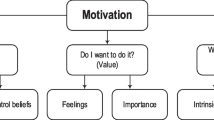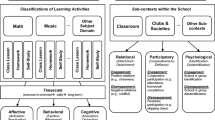Abstract
This paper is part of a range of studies that seek to improve classroom interactions to promote good teaching and learning in science education, in this case undergraduate chemistry. Here we focus upon learning through questioning and deal with some of the mechanisms of students’ question asking. All summaries of research in this field show that teaching through encouraging students to ask questions results in gains in comprehension and understanding, which can be tested in a variety of ways. Over time we have amassed evidence that questions aid the structuring of learning through clarification of intent, fact finding, improving grasp of principles, and clarifying the explicit and tacit organization of learning to be done. We have tackled four forms of interaction between question asking and attendant emotions: within internal processes, on the social production of questions, on the subject matter of questions, and on the outcomes of question asking. We use examples from a range of our own studies to illustrate these interactions, culminating in four student case studies where students had the opportunity to set out reflective questions concerning their learning and their involvement with their chemistry courses. Within these studies, we have also provided illustrations of the ’iterative duality’ of questions, as both stimuli for and outcomes of variation and change in students’ thinking.
Sommaire exécutif
Cet article fait partie d’une série d’études visant à améliorer les interactions dans la salle de classe, afin de promouvoir la qualité de l’enseignement et de l’apprentissage en enseignement des sciences, et dans ce cas en particulier de faciliter „l’orchestration” de bons cours de chimie au premier cycle universitaire. Depuis plusieurs années, nous explorons les formes et les fonctions qui caractérisent les questions posées par les apprenants au cours des activités d’apprentissage et d’enseignement dans le cadre des systèmes formels d’enseignement des sciences. Dans cet article, nous nous penchons sur deux questions principales: l’interrelation entre les questionnements et les affects, et la „ dualité itérative ” des questionnements, qui sont à la fois le point de départ et le résultat d’une variation et d’une évolution dans la pensée des étudiants. Dans nos travaux, nous nous intéressons également au rôle que jouent les émotions dans l’apprentissage, et dans le présent article nous unissons ces deux objectifs. Nous estimons que les affects jouent quatre rôles dans le questionnement, où les émotions ont un impact sur: (a) les processus internes au fur et à mesure que les étudiants cherchent à comprendre, (b) la production sociale de questions au sein de petits ou de grands groupes, (c) le contenu des questions et (d) les résultats obtenus grâce aux questions posées. Nos travaux antérieurs nous ont permis de mettre au point une taxonomie des types de questions, dont l’un est le questionnement de type réfléchi - lié aux problèmes de jugement, aux principes qui guident les actions, à l’expression des sentiments, à l’analyse des croyances et à la remise en question de certaines idées. Nous explorons les façons dont les questionnements peuvent provoquer la perplexité et la curiosité et comment le doute et la perplexité peuvent à leur tour générer des questions. Entre d’autres mots, nous cherchons à comprendre de quelles façons les questions sont elles-mêmes sources d’autres questions. Dans notre méthode de recherche, nous nous servons souvent d’entrevues, de récits d’étudiants et d’études de cas. Nous utilisons des exemples tirés des différentes études que nous avons réalisées pour illustrer ces interactions, et nous terminons avec quatre études de cas où les étudiants ont l’occasion de proposer des questions de réflexion au sujet de leur apprentissage et de leur participation à leurs cours. Ces quatre étudiants, inscrits à différents cours du premier cycle en chimie, illustrent certaines des nombreuses complexités liées à la génération des questionnements à ce niveau.
Similar content being viewed by others
References
Alsop, S.J., & Watts, D.M. (2000). Facts and feelings: Exploring the affective domain in the learning of physics. Physics Education, 35(2), 132–139.
Alsop, S.J., & Watts, D.M. (2002). Student generated questions: Three studies in the teaching and learning of science. Ontario Institute for Studies in Education (OISE) Papers in Science. Technology. Society and Environment (STSE) Education, 3, 145–158.
Alsop, S.J., & Watts, D.M. (2003). Science education and affect. International Journal of Science Education, 25(9), 1043–1048.
Brockbank, A., & McGill, I. (2000). Facilitating reflective learning in higher education. Buckingham, UK: Open University Press.
Chin, C.A, & Brewer, W.F. (1993). The role of anomalous data in knowledge acquisition: A theoretical framework and implications for science instruction. Review of Educational Research, 63(1), 1–49.
Ciardiello, A.V. (1998). Did you ask a good question today? Alternative cognitive and metacognitive strategies. Journal of Adolescent and Adult Literacy, 42(3), 1–13.
Claxton, G. (1991). Educating the inquiring mind: The challenge for school science. New York: Harvester Wheatsheaf.
Dennett, D.C. (1991). Consciousness explained. London: Penguin.
Dillon, J.T. (1988). Theory and practice of student questioning. In S. Karabenick (Ed.), Strategic help seeking: Implications for learning and teaching (pp. 195–218). Mahwah, NJ: Lawrence Earlbaum Associates.
Good, T.L., Slavings, R.L., Harel, K.H., & Emerson, M. (1987). Students’ passivity: A study of question asking in K-12 classrooms. Sociology of Education, 60, 181–199.
Graesser, A.C., & McMahen, C.L. (1993). Anomalous information triggers questions when adults solve quantitative problems and comprehend stories. Journal of Educational Psychology, 85, 136–151.
Graesser, A.C., & Person, N.K. (1994). Question asking during tutoring. American Educational Research Journal, 31(1), 104–137.
Jones, L., & Atkins, P. (2000). Chemistry: Molecules, matter, and change (2nd ed.). New York: W.H. Freeman.
Kelly, G.A. (1955). A theory of personal constructs. New York: Norton.
Kemmis, S. (1991). Action research and social movement: A challenge for policy research. Educational Policy Analysis Archives, 1(1), 1–12.
King, A. (1992). Facilitating elaborative learning through guided student generated questioning. Educational Psychologist, 27, 111–126.
King, A. (1994). Autonomy and question asking: The role of personal control in guided student-generated questioning. Learning and Individual Differences, 6, 163–185.
Lemke, J.L. (1993). Talking science: Language, learning and values. Norwood, NJ: Ablex.
Marton, F., & Booth, S. (1997). Learning and awareness. Mahwah, NJ: Lawrence Erlbaum Associates.
Miller, R.L. (1999). Researching life stories and family histories. London, Sage.
Miyake, N., & Norman, D.A. (1979). To ask a question one must know enough to know what is not known. Journal of Verbal Learning and Verbal Behaviour, 18, 357–364.
Moon, J.A. (2005). A handbook of reflective learning: Theory and practice. London: Routledge Falmer.
Pedrosa de Jesus, M.H., Teixeira-Dias, J.J.C., & Watts, D.M. (2003). Questions of chemistry. International Journal of Science Education, 25(1), 1–20.
Pedrosa de Jesus, M.H., Almeida, P., & Watts, D.M. (2004). Questioning styles and students’ learning: Four case studies. Educational Psychology, 24(4), 531–548.
Pedrosa de Jesus, M.H., Almeida, P., & Watts, D.M. (2005). Orchestrating learning and teaching in inter-disciplinary chemistry. Canadian Journal of Science, Technology and Mathematics Education, 5(1), 71–84.
Pedrosa de Jesus, M.H., Neri de Sousa, F., Teixeira-Dias, J.J.C., & Watts, D.M. (In press). Organising the chemistry of question-based learning: A case study. Journal of Research in Science and Technology Education.
Perkins, D.N. (1995). Outsmarting IQ: The emerging science of learnable intelligence. New York: Free Press.
Piaget, J. (1971). Biology and knowledge. Edinburgh, UK: Edinburgh University Press.
Reason, P., & Rowen, J. (1981). Human inquiry: A source book of new paradigm research. Chichester, UK: John Wiley.
Rosenshine, B., Meister, C. & Chapman, S. (1996). Teaching student teachers to generate questions: A review of the intervention studies. Review of Educational Research, 66, 121–181.
Salmon, P. (1988). Psychology for teachers: An alternative approach. London: Hutchinson.
Teixeira-Dias, J.J.C., Pedrosa de Jesus, M.H., Neri de Sousa, F., & Watts, D.M. (In press). Teaching for quality learning in chemistry. International Journal for Science Education.
Van der Meij, H. (1994). Student questioning: A componential analysis. Learning and Individual Differences, 6, 137–161.
Veenman, M. (2004, November). Questioning as a metacognitive skill. Paper presented to the First European Seminar on Student Generated Question, University of Aveiro, Portugal.
Watts, D.M. (2003). The orchestration of learning and teaching methods in science education. Canadian Journal of Science, Mathematics and Technology Education, 3(4), 451–464.
Watts, D.M. (2004, November-December). Technological access towards social inclusion: Some developments in science education in the UK. Paper presented to the UNESCO International Seminar ‘Quality Science for All,’ Brasilia, Brazil.
Watts, D.M. (In press). Orchestrating the confluence: A discussion of science, passion and poetry. In S.J. Alsop (Ed.), Beyond cartesian dualism: Encountering affect in the teaching and learning of science. Dordrecht, The Netherlands: Springer Kluwer Press.
Watts, D.M., & Alsop, S.J. (2000, May). Terms of engagement: Learners and school science. Paper presented to the Annual Conference of the Canadian Society for the Study of Education, University of Edmonton, Canada.
Watts, D.M., Alsop S.J., Gould, G.F., & Walsh, A. (1997). Prompting teachers’ constructive reflection: Pupils’ questions as critical incidents. International Journal of Science Education, 19(9), 1025–1037.
Watts, D.M., & Pedrosa de Jesus, M.H. (In press). Questioning. Paper to be published by the Staff and Educational Development Association (SEDA), London.
Watts, D.M., & Walsh, A. (1997). Affecting primary science: A case from the early years. Early Child Development and Care, 129, 51–62.
Author information
Authors and Affiliations
Rights and permissions
About this article
Cite this article
Watts, M., de Jesus, H.P. The Cause and Affect of Asking Questions: Reflective Case Studies from Undergraduate Sciences. Can J Sci Math Techn 5, 437–452 (2005). https://doi.org/10.1080/14926150509556674
Published:
Issue Date:
DOI: https://doi.org/10.1080/14926150509556674




